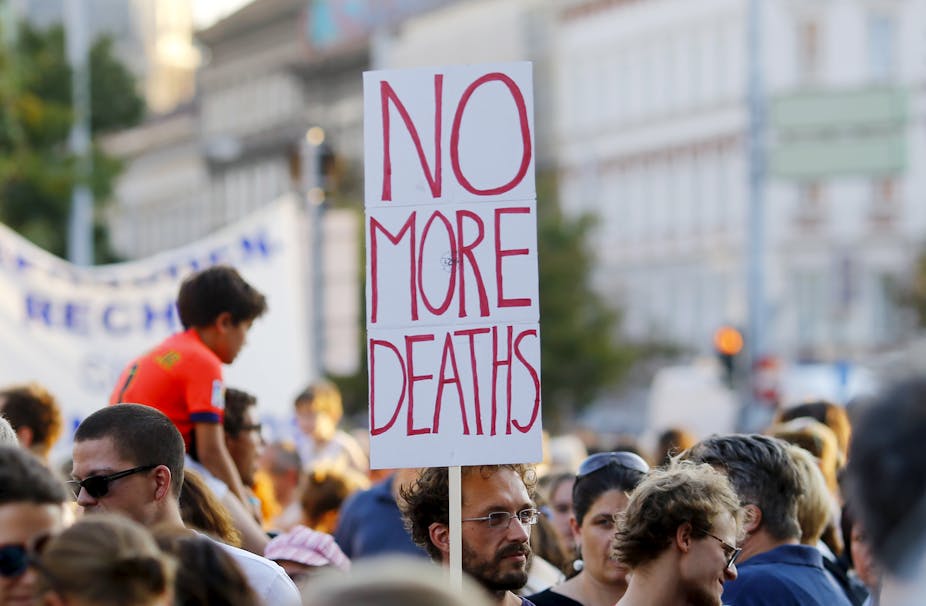Something is changing. Desperate people are still arriving on Europe’s borders and on its shores, as they have been for months and years. But the tone of the public’s reaction is shifting fast.
We’re starting to hear less about the “threat” posed by these people and more about the “unbearable” sight of a three-year-old boy washed up, dead, on the shore of Turkey, and everything it implies.
European leaders continue to say that taking in more refugees will not solve this crisis, and that the rules of the Schengen zone “must be respected”. But they appear to be out of step with this changing public feeling.
Increasing numbers of people across Europe are offering support to displaced people in large and small ways. They are signing online petitions, sending money, visiting the camps in Calais, joining protests, and even offering shelter in their own homes.
Going too far
Two years ago, Britain’s coalition government ramped up its attempts to talk “tough” on migration. As part of a group of researchers, I have been working since then to identify the effects of this tough rhetoric on public opinion and on people’s lives.
Government advisers told us that the British public simply will not listen to facts and figures on immigration; that the public is worried that immigration is a threat, and the government has to be seen to be acting on that threat.
But what our research found is that rhetoric about ever-tougher measures to control migration does not reassure people – in fact, whatever people’s position on immigration, such measures can make them more fearful.
People who see migration as a threat told us they see government publicity as pure theatre. It can never be tough enough; there can never be enough fences or guards. People who feel targeted by measures to control immigration, whether they are immigrants or not, feel increasingly unwelcome, excluded, and unable to function normally in their own homes.
We also found that the tough rhetoric and action by the government – promising to control “swarms” of people, publicising raids and enforcement measures – have led to increasingly vocal activism opposing them.
The “Go Home” vans and public raids seen in Britain over the summer of 2013 mobilised people to gather both in the streets and online to counter the UK’s Home Office enforcement, and to show solidarity with the people affected.
This drew in people who had not been active in politics before, for example the BritCits group, which was organised to support British citizens with non-EU partners threatened with separation by new immigration rules.
Stirred into action
Now, we are seeing much more vivid pictures of the mass movement of people that bring home just what it means. The focus is back on borders, and not on enforcement on our streets.
But this stage of the crisis has stirred a similar impulse to the one we identified in our research. Across Europe, ordinary people are offering their homes, their money, their time, and their support to those in desperate need. It seems that it has taken the unbearable image of Aylan Kurdi – the three-year-old boy who drowned – to have this recognised as a public outcry.

But desperate images of people drowning or close to drowning – including other children – have been out there for a some time. The figures for the numbers of people drowned trying to seek shelter in Europe were well known.
There are constant reminders that, compared to the number of displaced people in the world as a whole, the numbers trying to enter the UK are tiny. And people across the UK were responding to this with both feeling and action.
This crisis is not new. For years, people have been dying while crossing borders and seeking sanctuary. They have been living in desperate, destitute conditions in the UK and other “advanced countries” after they are refused asylum. They have been held without charge for indefinite periods in the prison-like conditions of detention centres, unable to return to their country of origin but unable to remain in their “host” country too.
And for years, the bulk of the media, most politicians, and a majority of the public have ignored these stories. But whatever it’s taken to get here, this is beginning to feel like a turning point.
On September 1, 20,000 people took to the streets of Vienna to demonstrate their support for refugees, just days after a similar march in Dresden. And on the morning of September 3, a petition on the UK parliament website hit 100,000 signatures, enough to require a parliamentary debate on increasing the number of people granted refuge in the UK. A few hours later, it was at nearly 200,000.
What happens next depends on ordinary people’s empathy and will to action – and on the courage and ethics of our political leaders.

